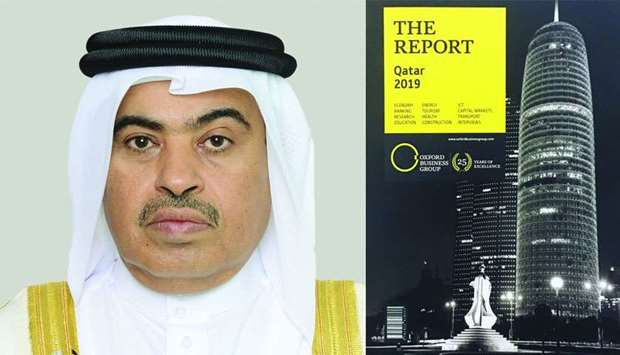Oil and gas price fluctuations have not "significantly affected" Qatar’s economic priorities and strategies, said HE the Minister of Commerce and Industry Ali bin Ahmed al-Kuwari.
Qatar has been implementing legislative and regulatory reforms to bolster the competitiveness of its business environment, with the aim of becoming far less reliant on mineral resources and coping with global challenges, he told the Oxford Business Group.
“The state has made significant progress in implementing major development projects aimed at realising the Qatar National Vision 2030. It has also successfully implemented several projects related to the 2022 FIFA World Cup, thanks to an increase in public expenditure to support the construction sector, which has helped cement Qatar’s position among the leading economies in the region and the fastest-growing economies around the world,” al-Kuwari said.
The 2018 budget boosts expenditure on major projects and confirms the direction of the state towards the completion of major projects in the main sectors, including those related to the 2022 FIFA World Cup. The World Bank predicts Qatar’s real GDP will grow by 2.7% in 2019 and 3% in 2020, as Qatar seeks to further promote foreign investments, the minister said.
Asked to what extent the blockade imposed on Qatar has affected its economic performance, the minister noted that since the illegal blockade was imposed in June 2017, Qatar “managed to weather the crisis and ensure that day-to-day life and business continue as normal” with the establishment of direct commercial routes to and from a number of strategic hubs around the world.
“Thanks to its leadership, Qatar has emerged stronger and more economically independent than it ever had been before,” al-Kuwari stressed.
Qatar’s foreign trade also showed remarkable growth over the course of 2017, he said.
The total foreign trade volume increased by 16% in 2017, reaching $103bn, as compared with $89bn in 2016.
Meanwhile, Qatar’s total exports increased by 18% to reach $67bn in 2017, up from $57bn in 2016, which led to a 49.9% increase in the trade surplus, up from $25.2bn in 2016 to an estimated $37.8bn in 2017.
“Taken together, all these positive indicators are indicative of the fact that we have overcome the challenges posed by the blockade and, as a result, cemented the country’s position as a highly attractive destination for foreign investments. Qatar is also seeking to bolster food security and ensure self-sufficiency in terms of vegetable, fish, livestock and dairy production. To achieve this, it is encouraging the private sector to invest in agricultural and farming projects,” al-Kuwari added.


